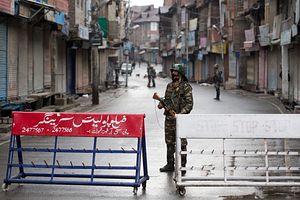India’s decision to integrate Jammu and Kashmir has complicated the region’s jihadist landscape. Escalation of violence looks like a real possibility with a massive jihadist infrastructure waiting and gearing up to take advantage of the situation.
It’s extremely worrying that the emerging narrative in Kashmir, which favors resentment among Kashmiris at a collective level, is set to provide extremist groups fodder for recruitment propaganda. This is exactly what India has been trying to avoid for decades. However, the post-integration lockdown situation appears to have achieved exactly what New Delhi set out to evade decades ago.
Observers are warning that transnational extremist groups such as the Islamic State (ISIS), Al Qaeda, and their local affiliates may have found an opening that didn’t exist for years. Extremist groups with bases in the valley can cause chaos not only in Kashmir, but also regionally.
Previously, the narrative in Kashmir had been averse to transnational groups preaching or carrying out violence against the Indian security forces. That may not be the case anymore: for better or worse, extremist sentiments are finding more space among the masses than they did in the past.
Al-Qaeda, which has struggled to make its brand attractive for years, is eyeing the situation in Kashmir as an opportunity for revival. In July, the group’s leader asked its fighters to inflict “unrelenting blows” on Indian security forces. There are other groups with transnational identities that want to make gains at the expense of the existing situation. In this regard, ISIS is already being projected as one of the emerging threats in Jammu and Kashmir. In March, the group announced a province in Kashmir and, a week ago, The Economic Times, quoting an intelligence report, noted that Kashmir had become a “hotspot of ISIS activities.”
The spillover effects of probable violence in the valley look like a real possibility. Pakistan is already considering deploying troops along the Line of Control (LoC). In an interview with the New York Times on Monday, Pakistan’s Ambassador to the United States Asad Majeed Khan noted that “If the situation escalates on the eastern border, we will have to undertake redeployments.” Arguably, after India’s Jammu and Kashmir’s integration, the situation along the LoC is going to remain tense for a longer period. One can call the condition on both sides of LoC a permanent crisis, which has the potential to lead to war.
The situation in Kashmir has generated a new dilemma for Pakistan’s foreign policy: While Pakistan would certainly like to take advantage of the situation, the country’s policymakers may run into trouble if credible evidence emerges, attributing attacks in the valley with links across the LoC. It is expected that any major decision in this regard will come after November when the Financial Action Task Force (FATF) meets to decide Pakistan’s case.
Pakistan’s policy-makers understand that the brewing violence in Kashmir is certain to create a crisis between Islamabad and New Delhi. For now, Pakistan would want to distance itself from terror-related incidents in Jammu and Kashmir, which might implicate Islamabad. It’s not a surprise that Pakistan’s military, as well as civilian leadership, has repeatedly warned of conversations which would link Pakistan to the existing crisis in Jammu and Kashmir. Arguably, there is an understanding in Islamabad that, for now, the situation in Jammu and Kashmir shouldn’t be seen as getting armed assistance from Pakistan. Moreover, there is an expectation that local agitation is going to create a serious situation for New Delhi in the valley in the coming weeks and months. Thus, in immediate terms, keeping anti-India militant groups in check is in Pakistan’s best interest.
However, it remains unclear if Pakistan can totally shut down groups aspiring to join the conflict in Kashmir. In this regard, the challenge doesn’t just come from organizations that have been banned by Pakistan, but also from groups and individuals that want to join under the banner of ISIS and Al Qaeda. For the next two to three months, Pakistan will have to work hard to keep in check such groups, and individuals.

































